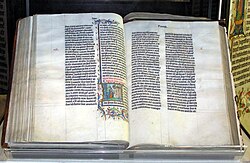
| Part of a series on the |
| Bible |
|---|
 |
| Outline of Bible-related topics |
| Part of a series on |
| Translation |
|---|
 |
| Types |
| Theory |
| Technologies |
| Localization |
| Institutional |
| Related topics |
|
The Bible is the most translated book in the world, with more translations (including an increasing number of sign languages) being produced annually.
Contents
- Geographically
- Alphabetically
- Translation efforts and organisations
- See also
- References
- External links
According to Wycliffe Bible Translators, on 1 August 2025, speakers of 4,007 languages (out of a total of 7,396 known languages) had access to at least a book of the Bible, including 1,433 languages with a portion available (chapters or whole books of the Bible), 1,798 languages with access to the New Testament in their native language, and 776 having the full Bible. [1] It is estimated by Wycliffe Bible Translators that translation may be required in 544 languages where no work is currently known to be in progress. They also estimate that there are currently around 4,457 languages in at least 173 countries which have active Bible translation projects (with or without some portion already published). [1] [2]
The rate of growth of translation has increased rapidly across the 20th and into the 21st century. In 1900, there were only 510 languages with any portion of the Bible available. By 2000, this had reached 2600 languages. [3] It is estimated that around the year 2033, every language will have access to at least some of the Bible. [4]